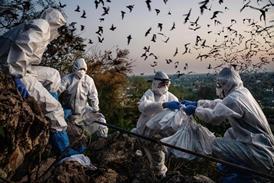
In South Korea, Jeonju International Film Festival today announced (Jan 14) they are moving forward “aggressively” with a safety-conscious physical edition that will have its number of selections back to pre-pandemic levels.
The 23rd edition of the festival will run April 28-May 7.
Jeonju was one of the first international festivals that opened in the early days of the pandemic in 2020 and last year expanded its hybrid system of online and offline screenings.
With increased vaccination rates, the festival this year is planning to present around 230 films in 18 sections, with 500 screenings in theatres. Jeonju saw record admissions in 2018 when it presented 241 films in 536 screenings at cinemas. Last year it had 186 films in 356 offline screenings.
“Opportunities come to those who are prepared. Since the Covid-19 pandemic, the Jeonju International Film Festival has been given a sort of duty to present measures and standards for holding film festivals in this country. We will do our best to prepare so that at this year’s physical festival, we will be able to meet with more audiences than in previous years,” said festival director Lee Joon-dong.
The festival is also planning a showcase of Taehung Pictures films - “tracking the roots of Korean cinema history” - to commemorate the legendary production house and its former CEO Lee Tae-won, who died this past October.
The retrospective of eight films will include classics such as Im Kwon-taek’s Cannes-awarded Chihwaseon (2002), Kim Yoo-jin’s erotic historical drama My Dear Keumhong (1995), Jang Sun-woo’s wry romance The Road To The Racetrack (1991) and Lee Doo-yong’s family drama The Oldest Son (1985).
Jeonju’s publicity team manager Choe Yeji confirmed to Screen that they are looking to invite a limited number of international guests and press, with possible quarantine exemptions.
“We are planning for different potential scenarios depending on the state of the pandemic in everyone’s respective countries, and especially what level of quarantine measures will be required in Korea at the time,” she said, adding the festival will therefore not be able to confirm exact numbers before March.
In addition to independent programming and strong retrospectives, Jeonju International Film Festival is known for its enthusiastic audiences that come from a wide range of ages.
The festival has also been funding and producing their own features through the Jeonju Cinema Project initiative, many of which have gone on to screen at festivals like Locarno and, this year, Berlin. Two Jeonju Cinema Project films - Dane Komljen’s Afterwater and Eric Baudelaire’s A Flower In The Mouth – are headed to the Berlinale Forum next month.

























No comments yet